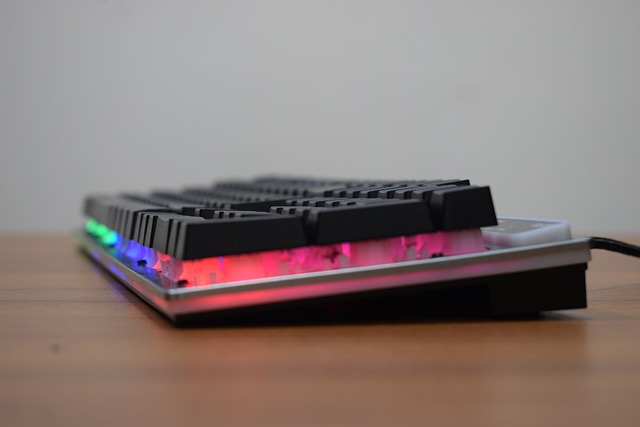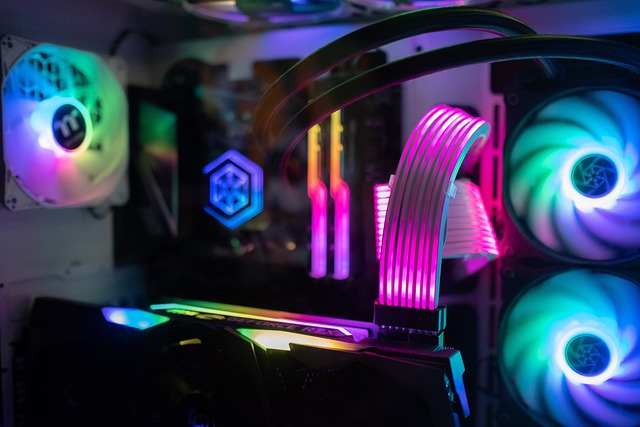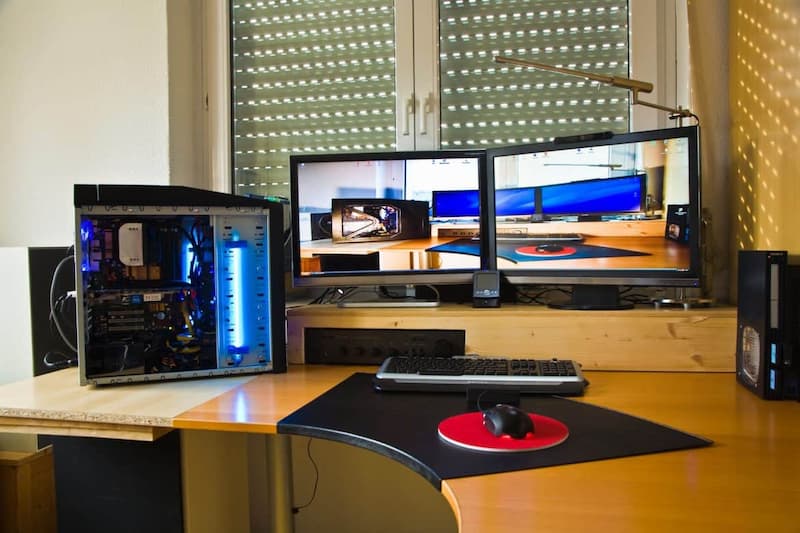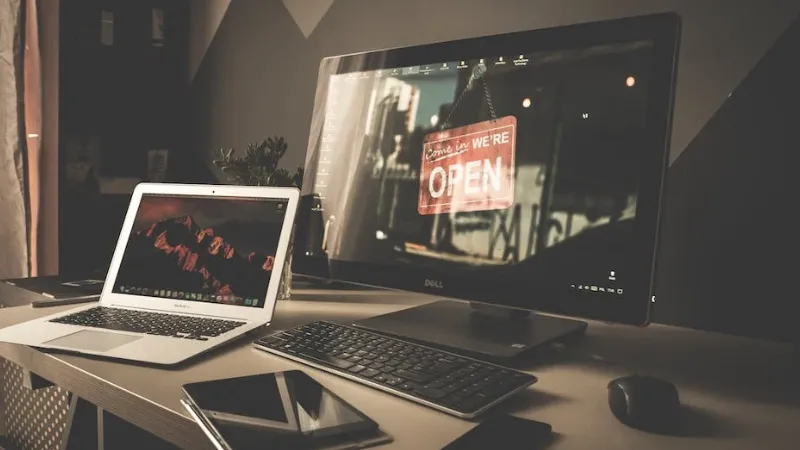What to look for when buying a gaming PC: in general, you need to check Parts Availability, Graphics Card (GPU), RAM, The PC Case, Design and Size, Audio Peripherals, Visual Peripherals, The Processor, Memory, and Storage.
Amazingly realistic graphics and fast-paced action can be found in contemporary computer games. These more recent video games necessitate powerful computers with strong processing and graphics capabilities due to their sophisticated features.
One of the most powerful PCs on the market today are gaming computers. They are equipped with multicore processors, cutting-edge graphics, and lots of memory. Additionally, they are fashionable and have special keyboard features that enhance the gaming experience.
Read this useful guide to help you choose the best gaming PC for you.
Table of Contents
What is a Gaming PC?
A gaming PC is, at its core, just a PC, but it differs from most other computers in several ways. A typical PC isn’t able to run anything more complex than basic games at low resolutions, though it can run office-based software, browse the internet, and allow for basic photo or video editing.
It’s crucial to choose a gaming system with hardware specifically designed for gaming if you want to play games at today’s level on your PC. Some older or simpler games may be playable on a standard PC, but to play the most recent games, you’ll need a dedicated graphics card and more potent hardware. The most computationally difficult tasks a computer can perform are some of the top games of today.
What to Look for When Buying a Gaming PC?
Parts Availability
The best choice is to purchase a PC from a manufacturer or retailer because the global chip shortage doesn’t appear to be going away anytime soon. The components you might need for your gaming PC might be hard to find on the shelf, but they are available if you buy a full PC.
Even if you choose this path, you must make sure that the gaming PC you buy has the right components for your requirements. Here are the key indicators to search for in order to assist you in doing this.
Graphics Card (GPU)
The CPU is referred to as the “brain” of your computer, and while it typically has integrated graphics, a dedicated GPU, or graphics processing unit, should be purchased for a gaming PC. Make sure you choose the right GPU for you because it will be the component that gives all of your games their stunning visuals.
AMD and NVIDIA are currently the top two producers of graphics cards. To be honest, it’s difficult to buy a “bad” graphics card if you’re getting one from one of these two manufacturers, but here’s what you should look for when making your GPU purchase.
While it’s crucial to consider a GPU’s cooling methods and clock rates, there is one thing you should examine above all else. Ensure that the GPU you select will work with the maximum resolution and refresh rate of your monitor, and vice versa. You should purchase a GPU that is capable enough if your monitor supports 4K at 60Hz, 1080p at 120Hz, or whatever the case may be, in order to avoid wasting money and getting a subpar gaming experience.
RAM
You must take into account two key factors when choosing the right RAM for your gaming PC, both in terms of quantity and type. How much RAM is required to support your gaming habits as well as any other regular PC tasks like email checking, photo editing, and schoolwork? Do you also want to save some money by purchasing older RAM or do you want to invest in the newest generation?
In general, more RAM is better, but that idea only holds true when discussing the same type of RAM across all circumstances. For instance, 16GB of DDR4 RAM is superior to 8GB of DDR4 RAM, but it will cost more. The one isn’t always better than the other, though, if you’re comparing 16GB of DDR3 RAM to 8GB of DDR4 RAM. It will depend on your usage patterns here as to whether you prefer to multitask frequently or prefer to complete one task at a time as quickly as possible. 16GB of DDR3 is better for multitasking; 8GB of DDR4 is better for speed.
DDR5 RAM is the most recent DDR version available, but it is currently much less common than DDR4 RAM. While you can spend a lot of money on DDR5 RAM modules for your gaming PC, DDR4 RAM modules are more affordable and have a track record of reliability that allows them to last for many years.

The PC Case
Although the components inside the computer are regarded as being more crucial than the case, the case is still important to take into account, particularly its size. There are small cases, medium cases, and large monolith cases.
Smaller systems can fit anywhere because of smaller cases. For gamers who don’t have a lot of desk space, they are a great option. It can get extremely hot inside a small case, which is its main drawback. Due to the close proximity of all your parts and the small size of the case, there may be a restriction in the flow of air into and through it, as well as around the components, which could raise the internal and part temperatures.
Most people prefer midsize towers. They can fit on or under your desk and offer sufficient airflow for the majority of PC parts. All that needs to be done is make sure the computer has enough events for air intake and exhaust.
Although they are more expensive than the other options, the large PC cases are the best for airflow. Larger cases are ideal for DIY PC construction because they are easier to work in and allow for more room for your hands.
Consider whether you require deluxe features like RGB lighting after choosing the size you require. There shouldn’t be much of a problem since many cases now have numerous ports. Just make sure the case has at least a few USB-A 3.1 ports and at least one USB-C 4.0 port.
Design and Size
Even though the internal components of your gaming PC are the most crucial, it’s impossible to ignore the aesthetics. Your computer tower case can make or break your gaming setup if you are going for a particular look or feel.
Most computer cases are black and white, but there are some that are more distinctive, like the Cougar CONQUER ATX case, that might better suit your personality. Additionally, you can customize the LED lights that are inside the majority of gaming PCs. Some LED lights only have one fixed color, while others are RGB LED lights that let you switch the color whenever you want.
Even though gaming PCs are frequently larger than average, if you don’t have much room in your home, you can still buy a compact or mini PC that can run games. Make sure you determine the case’s dimensions and the best location for it. Some people leave their gaming computers on the ground, while others enjoy putting them on display on their desk.
Audio Peripherals
The immersiveness of your gaming experience depends heavily on the sound quality, even if you don’t consider yourself to be an audiophile. Your audio peripherals could be as simple as a great pair of headphones that allow you to cancel out all background noise and concentrate solely on the action occurring in the game in front of you.
Or, you could spend money on a pair of high-quality surround sound speakers for your desk if you live alone, are in an open space, or prefer audio through speakers over headphones. Even though some monitors come with built-in speakers, they frequently aren’t very good. You’ll be grateful you spent money on speakers that won’t distort and tinnify game audio later, much like the difference between using TV speakers and a soundbar.
If you play video games with friends or broadcast them on Twitch or YouTube, a microphone is another crucial audio accessory to take into account. Although some gaming headphones or headsets include a built-in microphone, a standalone mic offers noticeably better sound quality.
Visual Peripherals
Even if your gaming PC runs flawlessly, your games will only look as good as your monitor can display. Although expensive, try to future-proof your setup as much as your budget will allow by investing in high-quality monitors.
A monitor with a 4K resolution and a 120Hz refresh rate is the “chef’s kiss,” but it might not be affordable for everyone. The smallest resolution that isn’t painful to the eyes is 1080p, and the smallest refresh rate that isn’t repulsive while gaming is 60Hz. Console gamers have long had to put up with 30Hz as the standard, but PC gamers have always enjoyed 60Hz as the norm.
In addition to selecting a monitor that satisfies your resolution and refresh rate requirements, you should consider the number of monitors you need, their size, and any additional features you may desire, such as an ultra-wide or curved monitor.
The Processor
Because it controls how the computer will function and play games, the processor is the most crucial component of the PC. The core count should be taken into account first. 4–16 core processors are sufficient for the majority of applications. Modern games and software might not run properly on CPUs with fewer than four cores.
At this time, six-core processors, which are in the middle, are a fantastic option. The 10th and 11th generation i5 or i7 processors from Intel will be excellent. A 12th-gen CPU, if you can find one, is ideal for future-proofing the computer. Although you could choose a 5900X, the Ryzen 5 5600X is a fantastic option for AMD. This 12-core CPU is designed for users who stream or do other activities other than gaming. If you do a lot of gaming and streaming at once, a 16-core AMD CPU like the 5950x is fantastic.
Memory and Storage
Since modern games require at least 8 GB of memory, there isn’t much to be said about it. Especially for an AMD system, get 16 GB of quick RAM that runs at or above 3200 MHz to be safe. Get 32 GB of RAM if you want to use your gaming PC for more than just gaming. For most games, this is excessive, but it’s acceptable for activities like video editing.
Make sure to select at least two memory sticks. Utilizing two sticks enables you to benefit from dual-channel memory, which improves performance.
Choose an SSD (Solid State Drive) for storage. Because they don’t have any moving disks, SSDs are much faster than mechanical drives. SSDs are also getting cheaper, and because of how much faster they make your PC, they are quickly becoming a necessity. Avoid using mechanical hard drives unless you need to store large amounts of data, like movies and music, on them.
Aim for at least 500 GB of SSD storage, and if necessary, upgrade to 1 TB. Start with 2 TB for a mechanical drive and increase from there.
If you want to build a fantastic gaming PC, there are many components to take into account. The aforementioned elements are the most crucial ones to take into account; later, you can add elements like video capture and Wi-Fi cards.
Who Should Buy a Gaming PC?
Purchasing a gaming PC will be most advantageous to a select group of gamers in society.
- Casual gamer. one or two video games that a player particularly enjoys. A casual gamer doesn’t want to spend thousands of dollars on a gaming PC, but they are addicted to one or two enjoyable games that they are familiar with, like an MMO or a free-to-play game like Fortnite or Apex Legends. To enhance the gaming experience at this level, it may be worthwhile to purchase a cheap gaming PC.
- those who play video games for more than 20 hours per week. If you prefer using a PC over a game console, a gaming PC provides a ton of flexibility with regard to game options. PC games are frequently less expensive to buy than their console counterparts.
- Streamers. You need a gaming PC that can play games quickly and with acceptable quality if you plan to stream your gaming content on Twitch and other streaming platforms. Nobody desires to see a streamer struggle to load a game.
- Home workers. You most likely already require a PC for work if you work from home. With a gaming PC, you can combine work and play so that your system can effectively handle all of your needs during the day and switch into game mode at night.
- Experienced gamers who like to mod. In general, you can mod or adapt games on a PC much more than you can with a console, which is one of the benefits of gaming PCs over consoles. With so many low-cost or free mods available, it’s a great way to enhance a beloved game.

What Should I Do After I Buy a Gaming PC?
If you’ve used a PC before, setting it up is going to be pretty straightforward once you transfer files from your old PC. Here is a brief summary of what to do next after purchasing a gaming PC.
- Buy a new monitor. You will need to purchase a new monitor since most gaming PCs don’t come with one. Try not to skimp on costs while doing your research on the best gaming monitors you can afford. A regular monitor will do, but a gaming monitor is preferable because it has better refresh rates and input lag, which means there is no chance of motion blur or a momentarily unattractive image.
- Buy new peripherals. Additionally, your gaming PC requires a new keyboard, mouse, headset, and possibly a game controller. It’s a great justification to upgrade even if you already have these (games console controllers work well). A headset is only essential if you plan on talking to teammates or you want more immersive sound, but buying a gaming keyboardand mouse are a good idea for most players. Programmable buttons and faster speeds are features found on many gaming mice. When playing fast-paced games, a mechanical gaming keyboard can be a significant improvement over a regular membrane-based one due to its increased responsiveness.
- Find a suitable living space for it. Make room in your living room, study, or den for the new gaming PC. Clean up some cabling so that the new setup is prepared for the new rig.
More Tips for Buying a Gaming PC
There are a few other factors you might want to think about before making the decision to purchase a gaming PC.
- Do you require a gaming PC?Due to a lack of free time, do you have an unused gaming system? Are the games you want to play already installed on the PC you own? If so, a gaming PC might not be necessary. When a good gaming PC costs so much, resist the urge to purchase one just for fun.
- Consider using a gaming laptop instead.If you prefer to game on the go or have a small home, a gaming laptop might be a good alternative. A gaming laptop is still very practical even though it is frequently more expensive than a regular gaming PC.
- Don’t forget about appearance. Gaming computers don’t have to be hardware-heavy black towers. Modern technology allows you to see inside your PC by adding RGB lighting and stylish windows. Look for one that complements both your personality and your sense of style.
Read about How to Buy a House at Auction Without Cash?
FAQs
How Do I Build a Gaming PC?
As an alternative to purchasing, building your own allows you to completely customize the memory, processors, and aesthetic of the computer from the beginning. You’ll begin with a fundamental case, then purchase and install the necessary parts (such as a logic board, memory, and CPU).
How Do I Optimize a PC for Gaming?
Most of the ways to make a PC run games better involve upgrades. For significant changes, you can upgrade the hardware by installing more memory, replacing the graphics card, and updating the drivers, but you can also perform some optimizations without doing so. Try ending unnecessary programs in Task Manager, cleaning up startup and shutdown items, and overclocking, which wrings more performance out of the hardware you have.


